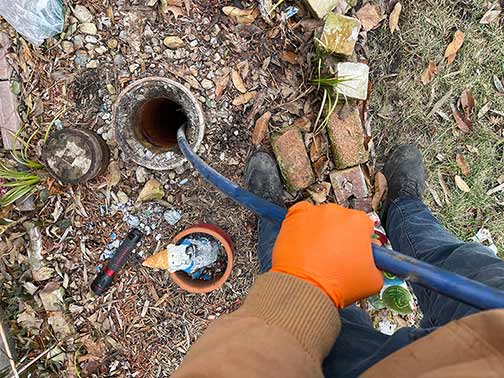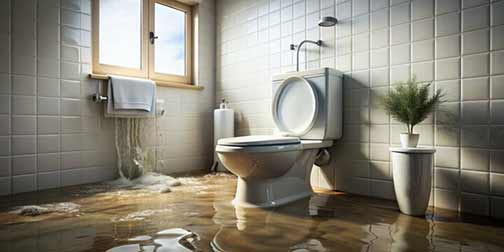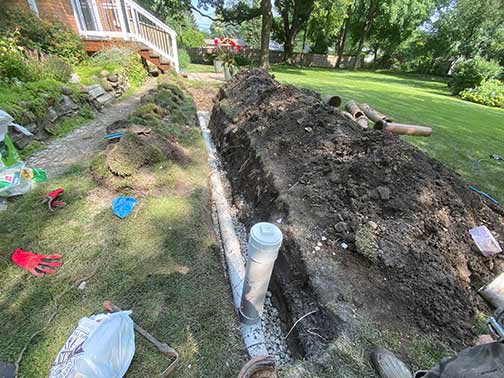Understanding the Importance of Sewer Line Maintenance
Sewer line integrity is a critical part of property management that is typically assumed until there are problems. Sewer lines divert waste from home and business properties to provide sanitation and proper function of the property. When the lines are clogged, though, the ramifications are catastrophic, leading to costly replacements and even property damage. Understanding the importance of regular maintenance and timely clog management is the secret to preventing these issues and safeguarding your property value.
Good sewer line care is not just a question of preventing blockages but also a way of guaranteeing the longevity and optimum function of your plumbing system. Regular maintenance identifies any issues that could become problems before they can escalate into major ones, saving property owners the inconvenience and expense of emergency repairs. Additionally, a well-maintained sewer system ensures the overall health and safety of the property by preventing unsanitary conditions caused by backups and overflows.
The importance of sewer line maintenance extends past the property alone. Clogged or crumbling sewer lines can lead to environmental hazards, such as the contamination of waterways. By prioritizing sewer line maintenance, property owners can be part of protecting the environment and promoting public health. This proactive step is not only good for individual properties but also helps in the greater goal of sustainable city development.
Determining the Causes of Sewer Line Clogs
To effectively evade sewer line replacements, it is essential to be aware of the common causes of clogs. In a majority of instances, sewer line blockages are caused by a buildup of debris, grease, and foreign objects that accumulate over time. Tree roots also invade sewer lines, forming blockages that impede the flow of wastewater. In addition, pipes that are older may be more susceptible to corrosion, which is a structural weakening that can exacerbate issues of clogging. One of these causes having been known, property owners can take preventative measures to ensure that clogs do not occur and that their sewer systems work effectively.
A common cause of sewer line clogs is improper disposal of waste. Many people unknowingly flush items that are not designed to be disposed of through the sewer line, such as wipes, feminine products, and paper towels. These items do not break up easily and can accumulate inside of the pipes, leading to clogs. Educating building residents on what is and is not flushable is an effective step towards clog prevention.
Environmental factors also lead to sewer line clogging. Heavy rainfall can overwhelm sewer systems, leading to backups and increasing the pressure on the pipes. For areas prone to floods, a solid sewer system that has the capacity to hold high volumes of water without clogging is essential. Regular inspections will show weak spots and prepare the system to handle inclement weather.
Carrying Out Preventative Maintenance for Sewer Line Health
Proactive management of sewer lines involves performing preventative interventions that address the potential for clogging before the condition becomes worse. Receiving routine inspection and maintenance from professionals can unearth the first signs of blockage and structural weakness in the pipes. Sewer rodding machines and high-pressure hydro jetting can be employed to remove debris effectively and prevent material buildup that causes piping clogging. Additionally, the root barriers will keep tree roots from entering sewer pipes, preserving their integrity and functionality.
One of the most effective preventative measures is to have backflow prevention devices installed. These devices permit wastewater to exit the property but not enter it, particularly when there is heavy rain or overloads on the system, reducing the risk of clogs and backups. Property owners must consult with plumbing professionals in order to determine what kind of backflow prevention device would be most suitable for them.
Routine sewer line cleaning is another preventative measure that is important. Even if there are no apparent signs of clogging, routine cleaning can remove potential blockages and ensure the smooth operation of the system. This proactive measure can save property owners time and money down the line by not letting minor issues turn into major ones.

The Cost Implications of Sewer Line Replacement
Sewer line replacements are not only disruptive but also costly. Replacing a main sewer line can be costly, impacting property owners’ budgets and potentially reducing the value of the property. By addressing clogs early and utilizing preventative measures, property owners can save themselves these expenses and preserve their property’s value. Investing in regular maintenance and early clog treatment is a cost-effective strategy that ensures the property’s integrity and long-term cost savings.
Replacement of sewer lines can be very expensive, and the cost varies according to the extent of damage and how challenging the replacement is. In addition to direct costs of materials and labor, indirect costs can also impact property owners, such as rental income lost while the repair is taking place or a decrease in property value. These financial implications make proactive management of sewer lines extremely necessary.
Also, the disruption caused by sewer line replacement can be significant. Property occupants may experience discomfort and inconvenience during the repair, which would affect their satisfaction with the property. Property owners can minimize the chances of replacement and ensure a good experience for occupants by emphasizing regular maintenance and timely clog management.
Enhancing Property Value through Sewer Line Management
Good sewer line management is a significant factor in enhancing property value. A well-maintained sewer system is part of the general function and aesthetics of a property, which renders the property more attractive to potential buyers or lessees. Homeowners can have a clean and operational waste management system that will add value to their property by preventing clogs and avoiding replacements. Furthermore, demonstrating a commitment to regular maintenance can offer reassurance to prospective buyers, emphasizing the property’s reliability and long-term viability.
Aside from the money saved from costly replacements, proper maintenance of sewer lines can also make the property more attractive. Prospective buyers will be more inclined to invest in a property that has a solid and functional sewer line as it means there is less risk for future problems. This enhanced marketability can mean improved property values and higher demand, which can serve to benefit property owners over time.
Moreover, a well-maintained sewer system can contribute to the overall aesthetics of the property. By preventing backups and overflows, homeowners can ensure the exterior of the property remains clean and appealing to the eye. This kind of attention to detail can go a long way in the general appeal of the property, attracting potential buyers and renters.
Protecting Environmental Responsibility
Repairing sewer line clogs can not only benefit homeowners but also aid in environmental sustainability. Well-managed waste guarantees that wastewater is effectively directed towards treatment facilities, thus avoiding pollution and contamination. By ensuring that the sewer lines remain intact, homeowners can assist in promoting sustainability and environmental conservation. Utilization of the eco-friendly processes, such as minimizing the quantity of poisonous chemicals and aiming for biodegradable products, can also enhance the environmental impact of sewer line maintenance.
Environmental responsibility extends beyond one’s property. By prioritizing sewer line maintenance, property owners are playing their role in sustaining urban development. A well-maintained sewer system reduces the risk of pollution and contamination, benefiting the community and the environment. Being proactive in this way aligns with the heightened emphasis on sustainability and environmental stewardship.
Furthermore, green sewer line management can enhance the image of the property. Buyers and renters are now seeking properties that align with their personal values, which include environmental sustainability and responsibility. By demonstrating concern for being environmentally friendly, property owners can attract environmentally conscious individuals and make the property more attractive.

Educating Property Owners about Sewer Line Management
Education is a key component of good sewer line management. Property owners must be informed about the importance of regular maintenance and the potential consequences of neglecting blockages. Workshops, manuals, and discussions with plumbers can provide excellent information regarding the best practices in sewer line maintenance. Informing property owners enables them to make reasonable choices that prioritize the health of their sewer systems and prevent costly replacements.
Educational programs can inform property owners about the complexity of sewer line management and the importance of being proactive. These programs can provide handy tips on how to identify early signs of clogging and when to seek professional assistance. Empowering property owners with knowledge, they can be proactive in sewer line maintenance and avoid costly replacements.
Along with these advantages, education can also foster a sense of community among property owners. By sharing information and experiences, property owners can coordinate best practices and solve common problems collectively. This sense of community can enhance the overall quality of sewer line management and serve the greater goal of sustainable urban development.
Conclusion: The Crucial Role of Timely Clog Management
In conclusion, timely clog management is a key component of expensive sewer line replacements. By understanding the causes of clogs, taking preventive measures, and informing property owners, the risks of sewer line blockages can be successfully mitigated. Proactive management not only sustains property value but also provides environmental stewardship and enhances the property’s overall desirability. Investing in continual maintenance and addressing clogs as soon as they happen is a strategic strategy that ensures the life and functionality of sewer systems, safeguarding the property’s integrity for years into the future.
The importance of timely clog management cannot be understated. By prioritizing regular maintenance and proactive measures, property owners can protect their investment and ensure the long-term operability of their sewer systems. This proactive approach not only benefits individual properties but also aligns with the broader goal of sustainable urbanization. As property owners prioritize sewer line maintenance as an ongoing concern, they can do their part to maintain the environment and promote community health.
Ultimately, sound sewer line management is a win-win-win for property owners, residents, and the planet. By meeting clogs aggressively and undertaking preventative measures, owners can enhance property value, promote environmental sustainability, and ensure long-term sewer system operation. This forward-looking approach is a strategic investment that yields dividends in the form of cost savings, enhanced marketability, and improved sustainability.


